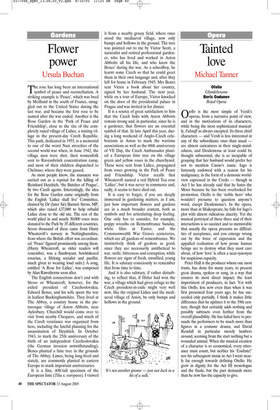Tainted love
Michael Tanner
Otello Glyndebourne Boris Godunov Royal Opera Otello is the most simple of Verdi’s operas, from a narrative point of view, and in the motivations of its characters, while being the most sophisticated musically, Falstaff as always excepted. Its three chief characters — and Verdi is less interested in any of the subordinate ones than usual are almost caricatures in their single-mindedness, and Desdemona at least could be thought subnormal, she is so incapable of grasping that her husband would prefer her not to mention Cassio’s name. Iago is famously endowed with a reason for his malignancy, in the form of a demonic worldview expressed in the Credo — though in Act I he has already said that he hates the Moor because he has been overlooked for promotion. Otello is the ‘noble hero’ who wouldn’t presume to question anyone’s word, except Desdemona’s. In the opera, more than in Shakespeare, he falls for Iago’s plot with almost ridiculous alacrity. Yet the musical portrayal of these three and of their interactions is so succinct and so memorable that usually the opera presents no difficulties of acceptance, and you emerge wrung out by the force of expression and the appalled realisation of how prone human beings are to destroy what they most care about, of how ‘love’ is often a near-synonym for suspicious rapacity.
Peter Hall is the producer whom one most trusts, has done for many years, to present great drama, spoken or sung, in a way that ensures its most direct impact; the least impertinent of producers, in fact. Yet with this Otello, less now even than when it was first presented four years ago, he has succeeded only partially. I think it makes little difference that he updates it to the 19th century, though that certainly adds nothing and possibly subtracts even further from the overall plausibility. He has failed here to persuade the performers to be much more than figures in a costume drama, and David Rendall in particular merely lumbers around, seeming from the start nothing but a wounded animal. When the musical creation of a character is so economical, every utterance must count, but neither his ‘Esultate!’ nor his subsequent music in Act I went nearly far enough towards defining Otello. He grew in dignity for the Act III monologue and the finale, but the part demands more than he now has the capacity to give.











































 Previous page
Previous page